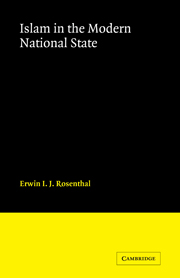Book contents
- Frontmatter
- Contents
- Introduction
- Acknowledgements
- Abbreviations
- Note on transliteration
- PART I CONTEMPORARY ISLAM IN CRISIS AND TRANSITION
- PART II ISLAM IN THE MODERN NATIONAL STATE
- SECTION I CONSTITUTIONAL ISSUES
- 8 The Islamic Republic of Pakistan
- 9 Islam in Malaya
- 10 Some observations on Islam in Iran and Turkey
- 11 Islam in Tunisia and Morocco
- SECTION 2 CHANGES IN LAW AND THE EMANCIPATION OF WOMEN
- SECTION 3 THE PLACE OF ISLAM IN NATIONAL EDUCATION
- Epilogue
- Notes
- Select Bibliography
- Index
- Frontmatter
- Contents
- Introduction
- Acknowledgements
- Abbreviations
- Note on transliteration
- PART I CONTEMPORARY ISLAM IN CRISIS AND TRANSITION
- PART II ISLAM IN THE MODERN NATIONAL STATE
- SECTION I CONSTITUTIONAL ISSUES
- 8 The Islamic Republic of Pakistan
- 9 Islam in Malaya
- 10 Some observations on Islam in Iran and Turkey
- 11 Islam in Tunisia and Morocco
- SECTION 2 CHANGES IN LAW AND THE EMANCIPATION OF WOMEN
- SECTION 3 THE PLACE OF ISLAM IN NATIONAL EDUCATION
- Epilogue
- Notes
- Select Bibliography
- Index
Summary
At the time of our visit, the Malays who are Muslims formed a little over half of the population of the Federation of Malaya, and the slightly smaller half consisted largely of Chinese, Buddhist or Christian, and to a much smaller extent of Tamil-speaking Indians. It was, therefore, reasonable to expect that amid the strains and stresses inherent in such a mixed population an Islamic state based on an Islamic ideology would not be the most appropriate institution. The Malays are a gentle, friendly people living mostly in the countryside and making a living by agriculture, largely rice and paddy planting, and by fishing. Commerce is almost entirely in Chinese hands, and industry, largely tin mining, in British hands, although the Chinese have begun to take an interest in industry as well, bringing capital from Hong Kong and the Chinese mainland. There is an upper stratum of Western-educated Malays who man the government and administration; the army and the police are also largely recruited from Malays. Political power is in Malay hands, but economic power in those of the Chinese and the British. We know that politics and economics cannot be kept separate, naturally, and the Malay government was and is making special efforts to secure a share of industry and commerce for the Malays.
In the Federation itself there was no special problem, but Singapore with 70 per cent of its population Chinese presented difficulties since a merger with Malaya was being considered.
- Type
- Chapter
- Information
- Islam in the Modern National State , pp. 287 - 306Publisher: Cambridge University PressPrint publication year: 1965
- 1
- Cited by



